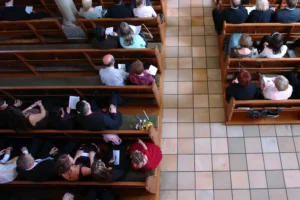I walk into the sanctuary, scanning the room for the 20- somethings I know. A group of about 30 of us sit on the left- hand side halfway back. I slide comfortably into a padded chair, located within a three-row radius of where I always sit, and chirp hello to acquaintances seated nearby.
Worship has already started. I look fashionable in my new black boots and headscarf — my eyes dart around to see if anyone has noticed. I make my first attempt to engage in the singing. I watch the worship leader in his corduroy pants and Gap sweater — olive green with a cream stripe. He’s reaching the upper limit of gen-X, but his attire is reminiscent of the guys I went to college with.
Why not? Our church is all about reaching the next generation. And I’m all for that. It’s one of the reasons I started attending this church. Everything I see on stage is comfortable yet appealing to my desire to be “with it.” My church doesn’t seem bound by tradition or legalism. I’m proud of the pastor’s willingness to call us to prayer “at the Spirit’s leading” or allow a ballet dance as part of worship. Yes, we’re nothing if not forward-thinking.
I find a deep sense of identity in my church. From its interlocking chairs to its professional band of rockers, my church expresses my personality — in the same way my boots or headband make me stand out. My church is an extension of my personal philosophy — open minded, artistic, progressive.
Ultimate Expression
We all long to be fully expressed and known. Paul addressed this in 1 Corinthians 13:12: “Now we see but a poor reflection as in a mirror; then we shall see face to face. Now I know in part; then I shall know fully, even as I am fully known.” Perfect expression is what man was created for.
Why else would we be so obsessed with being individuals? From cars to friends to cell phone rings, the things we make a part of our worlds contribute to our sense of self. The type of church I attend says something about me. If I go to a conservative church, I like structure and tradition. If I attend a charismatic church, I prefer experiential worship. If I attend a small church, I have a heart for being a part of something intimate with the promise of growth. But is choosing a church based on personal style and preference biblical? I’ll admit it. My tendency is to look for a church that makes me feel good — a church that “fits me.” It’s the same way I choose other things in my life — my clothes, my apartment, my furniture. But should that be the way I choose my church?
The Church Next Door
In the community of early Christians there wasn’t much choosing going on. The relatively small number of people who believed Jesus Christ was the risen Messiah, were considered part of one body. The church was divided into smaller groups based on geographic location. City churches, such as Corinth, Laodicia and Thessalonica were further split into smaller communities, which met in homes.
If I were a Christian in the first century, I would go to Doris’ house down the street to worship, and that’s where I would serve and have community. I would have nothing to compare it to, so I probably wouldn’t give much thought to the pastor’s preaching style or the brand of worship. My church would be a group of Christians, and, as such, reflect me — a Christian.
There are benefits to choosing a church that’s close by. A church within walking distance is going to be a convenient place to serve and invite those in my neighborhood. But in many cities, there may be dozens of churches within a 5- minute drive. So what other criteria are important to consider when choosing a church?
The New Testament says a lot about the early church, but you don’t read about style or preference being considerations for attending. Instead of a “What can my church do for me?” perspective, we find the opposite attitude: “What are my responsibilities to the church?”
It has been very helpful in my own church search to examine the practices of early Christians and their approach to worship. Here are a few characteristics I found in Scripture about the early church I used to form my own biblical criteria for choosing a church.
The early church promoted sound doctrine.
Whether a church teaches correct theology should be a primary concern when choosing a church home. Paul warned in 2 Timothy 4:3, “For the time will come when men will not put up with sound doctrine. Instead, to suit their own desires, they will gather around them a great number of teachers to say what their itching ears want to hear.”
Sadly, this verse does a pretty good job describing the culture we live in. Many people prefer attending a church where the messages are comfortable and the pastor sticks to “safe” topics that don’t offend. But Scripture is clear that one of the church’s top priorities should be to preach the truth and protect itself from the poison of false teachings.
While it’s important that the pastor be an individual of high character who upholds the Word of God, the church also needs to provide a structure of accountability through elders. Speaking of the ideal elder, Titus 1:9 says, “He must hold firmly to the trustworthy message as it has been taught, so that he can encourage others by sound doctrine and refute those who oppose it.” A group of strong, godly leaders can protect the body from a false gospel.
The early church prayed for persecuted Christians.
Acts 12:5 says, “So Peter was kept in prison, but the church was earnestly praying to God for him.” A culture of prayer and concern for fellow Christians marks the ministry of the early church. They were outwardly focused and tuned in to the needs of those around them. They provided a crucial prayer ministry for those facing hardship.
Today thousands of Christians in countries like China, India and Pakistan are facing severe persecution, and churches basking in the religious freedom of the United States are in a perfect position to pray fervently for these endangered brothers and sisters. Whether they do says a lot about their priorities.
The church grew as a result of personal evangelism.
Acts 2:46-47 tells an exciting story: “Every day they continued to meet together in the temple courts. They broke bread in their homes and ate together with glad and sincere hearts, praising God and enjoying the favor of all the people. And the Lord added to their number daily those who were being saved.”
Growth is a high priority for most churches. Pastors and leaders look for ways to present bigger services and provide better programs that will attract those outside the church.
The majority of growth in the early church took place in homes. One-on-one relationships are far more powerful for evangelism than corporate programs (just look at the disciples). A church should be supporting and encouraging its members to engage in personal evangelism.
The church regularly commissioned its members to go out and serve.
One primary responsibility of the early church was to send people out for ministry to other areas. In Acts 15, the church sent Paul and Barnabas to share the good news in Phoenicia and Samaria. Not everyone in the church was in a position to go, but they were in the position to send in the power of the Holy Spirit.
While growth can be a sign of a healthy church, the goal is not to keep everyone inside a bubble. The church should act as a home base for those going out, and members should actively participate in supporting missionaries financially and through prayer.
A variety of spiritual gifts were in regular use.
Paul lists a variety of church-building gifts in 1 Corinthians 12:28. The list includes teaching, administration and service. In the same chapter, he points out the temptation to elevate the more visible gifts, such as teaching, above lesser gifts, such as service. We know exactly what Paul means: The gifted teacher with the witty stories will receive more attention than the quiet retiree who comes into church an hour early every Sunday to turn on the coffee pot.
Paul emphasized that no gift should be belittled or treated as less important, because all spiritual gifts are essential to the church. A body of believers should encourage every person, no matter how seemingly insignificant, to use his gifts, and should not give an excessive amount of honor, or special treatment, to those whose gifts are more noticeable.
The body demonstrated submission to the Lordship of Jesus Christ.
This one seems obvious, but a church that is consistently seeking out the agenda of Christ above its own is rare. And this goes beyond correct theology.
“For the husband is the head of the wife as Christ is the head of the church, his body, of which he is the Savior,” Ephesians 5:23 says. Just as the submission of a wife to her husband is difficult, the church yielding to Christ also takes daily effort. A church must constantly be checking its motives and bringing itself under Christ’s authority.
More Than an Accessory
All of the characteristics of the early church required commitment — living and breathing God’s Word in community. It takes time to establish a solid prayer ministry or build relationships with missionaries. As part of a generation that often abandons something the moment it goes out of style or ceases to interest us, we face the temptation to leave a church simply because it doesn’t perfectly reflect us.
I have seen friends jump from church to church, searching for the “perfect fit.” When we adopt a consumer’s mentality about Christ’s body, we risk missing a rich reward. Galatians 6:9 says, “Let us not become weary in doing good, for at the proper time we will reap a harvest if we do not give up.”
It’s important to not lose sight of the original purpose of the church: to be a light to the world. The early church did what it was called to do. It was Christ’s hands and feet on earth.
My church may reflect my personality and preferences, but does it allow me to exercise my spiritual gifts? The programs may be spectacular, but am I being spurred on to personal evangelism? The worship may be professional, but is my heart honoring God? After all, it is His church, not mine.
After you’ve done your best to choose a church that follows a biblical model, then it’s valid to consider personal preference. Does the church share your passions? Does its vision resonate with your heart’s desire? Does it encourage you to serve at your stage in life?
When I slip into my chair each Sunday, I have a longing to be expressed and known. But self-expression is fleeting and changes on a whim. (Next season my boots won’t be in fashion, and I’ll likely move on to the next thing.)
True self-expression will take place only as I seek to reflect Christ in every area of my life and commit to investing in a community of believers. Christ’s body is not something to be molded into my image. It’s a place where I can be molded into His. I want Christ’s body to be more than an accessory — I want it to be my heart.
Copyright 2005 Suzanne Hadley. All rights reserved.











